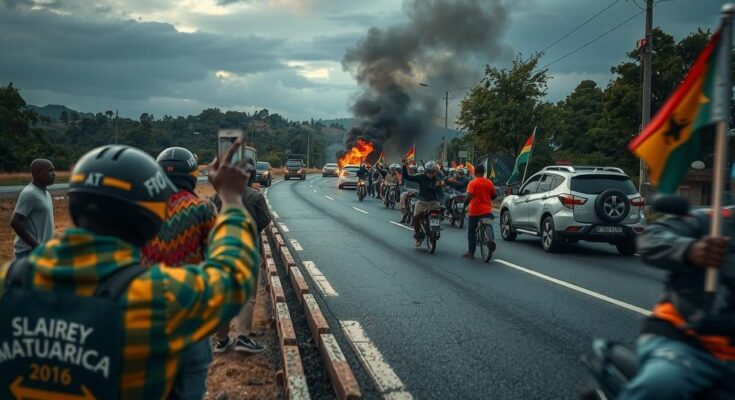Protesters in Mozambique’s Ressano Garcia town have blocked the main highway to South Africa by seizing trucks. This unrest followed allegations of electoral fraud after recent elections, where the ruling party retained power. Intense public discontent has led to calls for verification of election results, while authorities encourage avoidance of border travel until peace is regained.
Protesters in Ressano Garcia, a town bordering South Africa, have taken to the main highway, blocking traffic by commandeering trucks on Monday. The Trans African Concessions, which oversees the highway, reported that public buses were also halted, compelling passengers to disembark and proceed on foot. The situation escalated with protesters igniting tires close to a toll plaza near Maputo, causing infrastructure damage. Authorities advised against crossing the border until stability is restored. The unrest follows Mozambique’s recent elections held on October 9, where the ruling party maintained its 49-year dominance with President Daniel Chapo reportedly securing 71% of the vote. This result has been contested by independent candidate Venâncio Mondlane, who labeled the elections as fraudulent and has initiated calls for protests to advocate for the voters’ true intentions to be honored. In light of these tensions, the Constitutional Council has requested the electoral authorities to submit tally sheets from seven of the eleven constituencies for verification purposes. The N4 highway is a crucial route linking the industrial core of South Africa to Maputo’s port, facilitating the export of essential minerals such as chromite and ferro-chrome, thereby underscoring the economic significance of the area affected by the protests.
This protest and blockade represent a significant backlash against the electoral process in Mozambique, highlighting underlying tensions within the country’s political landscape. The elections conducted on October 9 have been marred by allegations of electoral fraud, primarily by the opposition, which has intensified public discontent. Given the importance of the N4 highway as an export route for South African goods, disruptions here have wider implications for both regional trade and economic stability. These events also reflect ongoing political strife, with calls for accountability and transparency in governance. The protests are a manifestation of broader social grievances which have accumulated over years, and this incident likely signals a pivotal moment in Mozambique’s struggle for political legitimacy as citizens increasingly demand their voices be heard in the democratic process.
In summary, the protest in Ressano Garcia not only illustrates the immediate disruption of key transportation routes but also underscores the deep-seated political issues facing Mozambique following controversial electoral outcomes. The government’s inability to address the grievances of the populace may foster sustained unrest. The situation remains dynamic, and the resolution of these tensions will be vital for restoring order and confidence in the electoral system. Authorities and citizens must engage to resolve these disputes in a manner that respects democratic principles and the rule of law.
Original Source: www.bnnbloomberg.ca




